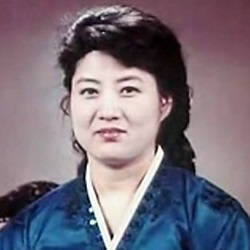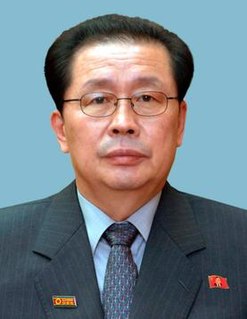
North Korea, officially the Democratic People's Republic of Korea, is a country in East Asia constituting the northern part of the Korean Peninsula, with Pyongyang as its capital and the largest city in the country. To the north and northwest, the country is bordered by China and by Russia along the Amnok and Tumen rivers, and to the south, it is bordered by South Korea, with the heavily fortified Korean Demilitarized Zone (DMZ) separating the two. Nevertheless, North Korea, like its southern counterpart, claims to be the legitimate government of the entire peninsula and adjacent islands.

Kim Jong-il was the second leader of North Korea. He ruled from the death of his father Kim Il-sung, the first leader of North Korea in 1994 until his own death in 2011.

Juche is the official state ideology of North Korea, described by the government as "Kim Il-sung's original, brilliant and revolutionary contribution to national and international thought". It postulates that "man is the master of his destiny", that the Korean masses are to act as the "masters of the revolution and construction" and that by becoming self-reliant and strong, a nation can achieve true socialism.
Kim Jong-chul, sometimes spelled Kim Jong Chol, is a son of former North Korean Supreme Leader Kim Jong-il. His younger brother is Kim Jong-un, now the leader of North Korea. His older half-brother was Kim Jong-nam, who was assassinated in February 2017.

The Korean Central News Agency (KCNA) is the state news agency of North Korea. The agency portrays the views of the North Korean government for both domestic and foreign consumption. It was established on December 5, 1946 and now features internet coverage.

Ko Yong-hui, also spelled Ko Young-hee, was the North Korean supreme leader Kim Jong-il's consort and the mother of North Korea's current leader, Kim Jong-un. Within North Korea she is only referred to by titles, such as "The Respected Mother who is the Most Faithful and Loyal 'Subject' to the Dear Leader Comrade Supreme Commander", "The Mother of Pyongyang", and "The Mother of Great Songun Korea."

In the North Korean government, the Cabinet is the administrative and executive body. The North Korean government consists of three branches: administrative, legislative, and judicial. However, they are not independent of each other.

Kim Jong-un is a North Korean politician who has been the supreme leader of North Korea since 2011 and chairman of the Workers' Party of Korea since 2012. He is the second child of Kim Jong-il (1941–2011), who was North Korea's second leader from 1994 to 2011, and Ko Yong-hui (1952–2004). He is the grandson of Kim Il-sung, who was the founder and led North Korea from its establishment in 1948 until his death in 1994.

Kim Sŏng-ae was a North Korean politician who served as the First Lady of North Korea from 1963 to 1974. She was the third wife of the President of North Korea, Kim Il-sung.
Censorship in North Korea ranks among some of the most extreme in the world, with the government able to take strict control over communications. North Korea is ranked at the bottom of Reporters Without Borders' annual Press Freedom Index, occupying the last place in 2017.

Jang Song-thaek was a leading figure in the government of North Korea. He was married to Kim Kyong-hui, the only daughter of North Korean President Kim Il-sung, and only sister of North Korean General Secretary Kim Jong-il. He was therefore the uncle of current leader of North Korea, Kim Jong-un.
The State Security Department (SSD) or the Ministry of State Security is the secret police agency of North Korea. It is an autonomous agency of the North Korean government reporting directly to the Supreme Leader. In addition to its internal security duties, it is involved in the operation of North Korea's concentration camps and various other hidden activities. It is reputed to be one of the most brutal police forces in the world, and has been involved in numerous human rights abuses.
General Kim Kyong-hui is the aunt of current North Korean leader, Kim Jong-un. She is the daughter of the founding North Korean leader Kim Il-sung and the sister of the late leader Kim Jong-il. She currently serves as Secretary for Organization of the Workers' Party of Korea. An important member of Kim Jong-il's inner circle of trusted friends and advisors, she was director of the WPK Light Industry Department from 1988 to 2012. Her husband was Jang Sung-taek, who was executed in December 2013 in Pyongyang, after being charged with treason and corruption.
Kim Man-il was the second son and child of North Korean leader Kim Il-sung and his first wife, Kim Jong-suk.

The death of Kim Jong-il was reported by North Korean state television news on 19 December 2011. The presenter Ri Chun-hee announced that he had died on 17 December at 8:30 am of a massive heart attack while travelling by train to an area outside Pyongyang. Reportedly, he had received medical treatment for cardiac and cerebrovascular diseases. During the trip though, he was said to have had an advanced acute myocardial infarction, complicated with a serious heart shock. However, it was reported by South Korean media in December 2012 that he had died in a fit of rage over construction faults at a crucial power plant project.

The North Korean cult of personality surrounding its ruling family, the Kim family, has existed in North Korea for decades and can be found in many examples of North Korean culture. Although not acknowledged by the North Korean government, many defectors and Western visitors state there are often stiff penalties for those who criticize or do not show "proper" respect for the regime. The personality cult began soon after Kim Il-sung took power in 1948, and was greatly expanded after his death in 1994.

On further improving party ideological work was the March 8, 1981 concluding speech by Kim Jong-il at the National Meeting of Party Propagandists in North Korea.
Socialism is the life of our people was a November 14, 1992 talk by Kim Jong-il with the Senior Officials of the Central Committee of the Workers' Party of Korea in North Korea.

The Kim dynasty, referred to in North Korea as the Mount Paektu Bloodline, is a three-generation lineage of North Korean leadership descended from the country's first leader, Kim Il-sung. In 1948, Kim came to rule the North after the end of Japanese rule in 1945 split the region. He began the Korean War in 1950 in a failed attempt to reunify the Korean Peninsula. By the 1980s, Kim developed a cult of personality closely tied to their state philosophy of Juche, which would later be passed on to his two successors: son Kim Jong-il and grandson Kim Jong-un.

The Order of Kim Jong-il is a North Korean order named after Kim Jong-il, the former leader of North Korea.















